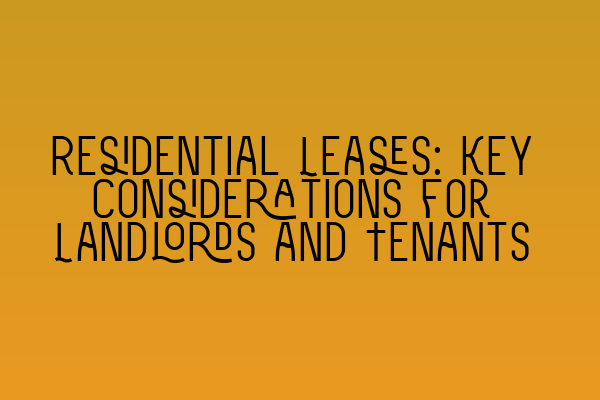Residential Leases: Key Considerations for Landlords and Tenants
Welcome to SQE Property Law & Land Law, where we provide expert legal advice and guidance on all aspects of property law. In this blog post, we will be discussing the key considerations that both landlords and tenants should keep in mind when entering into residential leases.
Understanding Residential Leases
Residential leases are legally binding contracts between landlords and tenants that outline the terms and conditions of the rental agreement. These agreements are crucial for both parties, as they establish the rights and responsibilities of each party throughout the duration of the lease.
For landlords, it is important to carefully consider the terms of the lease to protect their property and ensure a smooth tenancy. Similarly, tenants should be aware of their rights and obligations to ensure a positive and secure living arrangement.
Key Considerations for Landlords
1. Rental Price: Setting an appropriate rental price is crucial for attracting potential tenants and ensuring a fair return on investment. Conducting market research and considering factors such as location and property condition can help determine an optimal rental price.
2. Lease Term: The lease term refers to the duration of the tenancy. Landlords should carefully consider the length of the lease, taking into account their long-term objectives and potential market fluctuations.
3. Repair and Maintenance: Clearly specifying the responsibilities for repair and maintenance in the lease can help avoid disputes and ensure that the property remains in good condition. It is recommended to conduct regular inspections and address any maintenance issues promptly.
4. Deposit Protection: In accordance with legal requirements, landlords must protect their tenants’ deposits in a government-approved deposit scheme. Failure to do so can result in severe penalties.
5. Insurance: Landlords should have appropriate insurance coverage to protect their property against any unforeseen events or damages. This can include buildings insurance, contents insurance, and landlord liability insurance.
For a comprehensive understanding of landlord obligations and how to protect your rights, check out our SQE 1 Practice Exam Questions and our SQE 1 Practice Mocks FLK1 FLK2.
Key Considerations for Tenants
1. Tenancy Agreement Review: It is essential for tenants to carefully review the tenancy agreement before signing. Pay close attention to clauses regarding rent increases, repairs, and termination conditions. Seek legal advice if needed to ensure your rights are protected.
2. Deposit Protection: Make sure your landlord protects your deposit in a government-approved scheme and provides you with the necessary information. Deposits should be returned promptly at the end of the tenancy, minus any reasonable deductions.
3. Rights and Responsibilities: Familiarize yourself with your rights and responsibilities as a tenant. This includes paying rent on time, reporting maintenance issues, and respecting the property and its neighbors. Understanding your obligations will help maintain a positive relationship with your landlord.
4. Notice Periods: Be aware of the notice periods required for terminating the tenancy. This will vary depending on the type of tenancy agreement and can be crucial if you decide to move out or if your landlord wants to end the tenancy.
5. Tenant Insurance: While landlords have insurance for the property, tenants should consider obtaining their own contents insurance to protect their personal belongings against theft, damage, or loss.
For a detailed explanation of tenant rights and how to navigate the rental process, take a look at our SQE 2 Preparation Courses and our SQE 1 Preparation Courses.
Conclusion
Whether you are a landlord or a tenant, understanding the key considerations involved in residential leases is crucial to protect your rights and ensure a successful tenancy. By carefully considering factors such as rental price, lease terms, maintenance responsibilities, and insurance, both parties can establish a fair and mutually beneficial rental agreement.
If you require further assistance or advice regarding residential leases or any other property law matters, please feel free to contact us. We are here to help you navigate the complexities of property law.
For upcoming SRA SQE exam dates, visit our SRA SQE Exam Dates page.
